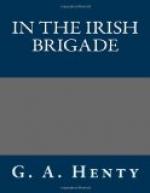“I shall begin to think what O’Neil and O’Sullivan used to say, that my luck would carry me through anything; and certainly, at present, it has been marvellous.”
“Which way will we go back, your honour?”
“Not the way we came, if we can help it. We were nearly a month coming from Genoa, and might have been twice as long, if the wind had not been fairly favourable. I think our best plan will be to take passage by sea to London. There we shall have no difficulty in finding a vessel bound for Rotterdam, or the Hague. Then we will buy horses, and ride along by the Rhine. If we can get through Luxembourg into France we will do so, but I think it will perhaps be best to go on through Switzerland, and pass the frontier somewhere near Lyons, where we shall be but a short distance from Berwick’s headquarters in Dauphiny.”
A month later, they rode into the duke’s camp. They had, on leaving Toulon, packed up their uniforms and sent them to the care of a friend on the general’s staff. To his quarters they first went, and having changed his civilian costume for a military one, Desmond waited on the duke.
“Why, Captain Kennedy,” the duke said, in surprise; “I did not look to see you again, so soon. Have you been over to Ireland?”
“I have, sir, and though there only a few days, gained information that necessitated my return here. I have found out that the name I go by is not mine, and that my proper name is Gerald O’Carroll.”
“The son of Major James O’Carroll, who fought by my side at the Boyne, and was through the first siege of Limerick with me! That explains it. Your face has often puzzled me. It seemed to me that I recognized it, and yet I could not recall whose face it was that it resembled so strongly. Now you tell me, I know at once. Your father, when I first knew him, was a few years older than you are; but he had the same figure, face, and expression.
“And so, you are his son! By what miracle have you discovered your relationship to him?”
Desmond, or as he should now be called, Gerald, related as briefly as possible the manner in which he had discovered his parentage.
“Your uncle must be a thorough villain,” the duke said, hotly. “That he was a traitor we all knew, but that he should thus rob his brother’s son of his inheritance is monstrous and unnatural.”
“I am glad, indeed, sir, that you have thus recognized me. Your testimony will go for much, even in an English court, and I hope to receive a similar recognition from the officers who were intimate with my father in the second siege, and whose names I have here.”
The duke glanced down the list.
“Well-nigh half of them are still alive,” he said, “and all of them are men of rank and repute, whose word would be taken even by an enemy. How do you mean to proceed? Because I am afraid that, even if we could spare them, there would be some difficulty about their making their appearance in a court, in either England or Ireland.”




